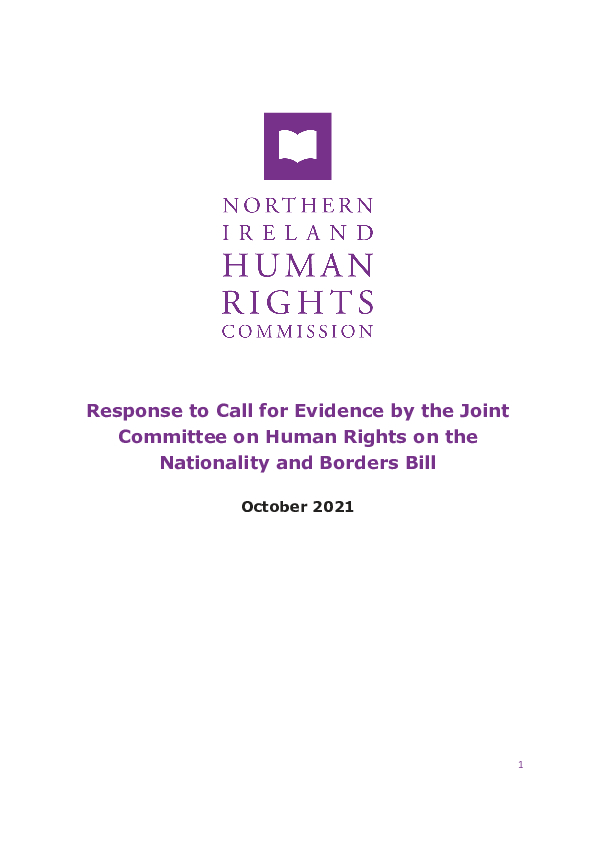NIHRC Response to Call for Evidence by the Joint Committee on Human Rights on the Nationality and Borders Bill
Date published: October 2021
Below is a summary of the recommendations/messages
The Commission recommends that:
3.4 Part 1 of the Bill should be amended to include the birthright commitment in the Belfast (Good Friday) Agreement to identify, and be accepted, as Irish or British or both without any loss of rights or entitlements.
4.4 Clause 10 is removed, and that no legal basis is afforded to a two-tier system of refugee and asylum law.
4.8 Clause 11 is amended to give clear legal recognition to the principle that detention should only be used as a measure of last resort and that further provision is made for review of the legality of such detention.
4.10 where detention is used (which is only used as a last resort) it is subject to robust oversight, inspection, and accountability mechanisms, which are themselves transparent to public scrutiny.
4.14 Clause 14 is removed. In the event that Clause 14 is not removed it should, at least, be amended to include a requirement: to provide written reasons for a declaration; to permit the right to appeal; to ensure “reasonable” is defined carefully and the factors to be taken into account are stipulated clearly.
4.17 Clauses 16 and 17 are amended to allow for the benefit of the doubt to be applied in all asylum applications and that no adverse findings regarding their credibility are made on account of the late submission of evidence.
4.19 in view of the prevalence and impact of trauma upon those seeking asylum and refugee status, that adequate training in trauma-informed practice is provided to all officials working with children and adults within the immigration and asylum system.
4.21 Clause 23(2) is removed and that the weight attached to relevant evidence is not decided by the stage at which it is provided.
4.25 Clause 29 is amended so that the civil standard of proof is removed and does not form part of the adjudicative framework in relation to refugee and asylum claims. The Commission further recommends that provision is made within the Bill for all relevant material factors to be considered in relation to the determination of an applicant’s ‘well-founded fear’ of persecution.
5.2 Clause 37 is removed or amended to give full effect to Article 31(1) of the Refugee Convention 1951.
6.11 the Committee enquire of the Minister what consideration was given to Article 2 of the Protocol in drafting Clause 56 and seek assurances that nothing in Part 4 of the Bill is intended to diminish the rights and safeguards within the EU Trafficking Directive.
6.12 Clause 56 is amended to clarify that no provision made in or under the Bill shall be inconsistent with Article 2 of the Protocol or otherwise cause a diminution of the rights, safeguards and equality of opportunity protected therein.
6.13 the Committee seek assurances from the Minister on how UK Government has built in consideration of Article 2 of the Protocol to the development and drafting of legislation and how continued compliance with this obligation will be ensured.
7.9 Clause 58 is amended to ensure that the best interests of the child will be the primary consideration in all age assessment procedures and that provision is made for the child’s voice to be heard in all matters which concern him/her. This should also mean that all relevant information to the child in advance of, and during the age assessment itself.
7.10 Clause 58 is amended to ensure that the presumption of minority is placed on a clear statutory footing.
7.12 Clause 64 is amended to allow for the benefit of the doubt to be applied in all asylum applications and to the evidence adduced in support of such an application.
8.10 the Bill contains an express commitment that the UN CRC’s four guiding principles (non-discrimination, best interests’ principle, right to life survival and development, and the right to participate) will be upheld for children.
8.11 the Bill contains an independent free-standing clause which states expressly that in all actions, decisions, policies, laws, and regulations which are enacted and undertaken under the Bill, the best interests of the child are a primary consideration, in line with Article 3 UN CRC.
8.12 the Bill contains an independent free-standing clause which states that in all actions, decisions, policies, laws, and regulations which are enacted and undertaken under the Bill, that the child will be entitled to express their views in all matters which affect him/her, in line with Article 12 UN CRC.
8.13 a children’s rights impact assessment be carried out in relation to the Bill’s impact on children.

Download Documents
Your browser is out-of-date!
Update your browser to view this website correctly. Update my browser now